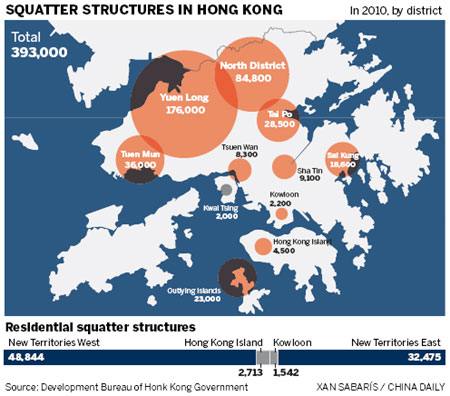Shantytowns face hard home truths
Good with the bad
Yet, for every pro there is a con. Although the four-lane highway running in front of Cha Kwo Ling has several minibuses carrying commuters to the two nearby subway stations, the majority of vehicles using the route are heavy-duty trucks carrying concrete and steel containers.
 |
A lot of the traffic is heading to the metal recycling plant at a walled quay on the other side of the road or a small paper recycling center in the shantytown.
The proximity to the harbour, while providing a costal vista and balmy breezes, also exposes the fragile shanties to the gales that hit Hong Kong every summer and autumn.
Like most shantytowns, the village does not have even basic facilities, such as a gas supply, which means residents have to use liquefied petroleum gas cylinders for cooking and bathing.
Arguably the worst problem is the lack of private toilets. The underground drainage pipes beneath Cha Kwo Ling are too narrow for human waste, so locals use public toilets on the outskirts.
"Only those who ignore the interest in public health would build indoor toilets (here)," said a 72-year-old woman who declined to give her name. "The hygiene (in the village) is not good in general. My tin house gets stifling in the summer."
The woman, who settled in the area after moving from the Chinese mainland in 1962, said she and her 80-year-old husband have recently applied for public rental housing.
With densely packed buildings, narrow passages and highly flammable building materials, fire hazards abound in Cha Kwo Ling.
"We have fire accidents almost every year," said Tse, whose village witnessed three fires in just one month in 2006, leaving hundreds of residents homeless.
It was a sweeping fire at a settlement in Shek Kip Mei in late 1953 that displaced some 53,000 people that prompted the then-colonial government in Hong Kong to introduce the public housing system.
Despite the danger, Tse insists the only thing that will make her abandon her house is "if it is demolished".
Like most others in the village, she and her husband would be unable to afford the cost of living in other areas of the SAR, let alone afford the rent on another cafe.
"Even public rental flats will charge us," said Wu Wai-yuk, a mainlander who arrived in Cha Kwo Ling in the 1980s. "I'd rather save the money."
"Zi li geng sheng", she said, a slogan widely known among those born in the era of former leader Mao Zedong that roughly translates as "rely on yourself to change your own life".
"I don't pin my hope on others," added Wu.
 0
0 







Go to Forum >>0 Comments